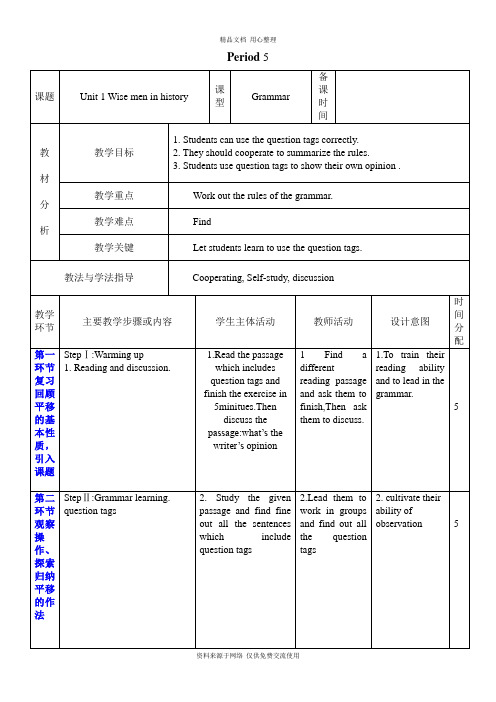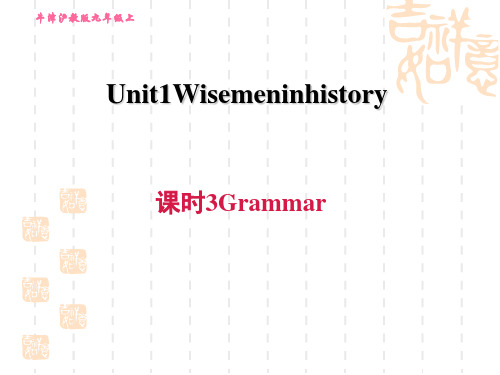沪教版(牛津)九年级英语上册Unit 1 Wise men in history - Period 2 公开课PPT课件
- 格式:ppt
- 大小:12.87 MB
- 文档页数:11
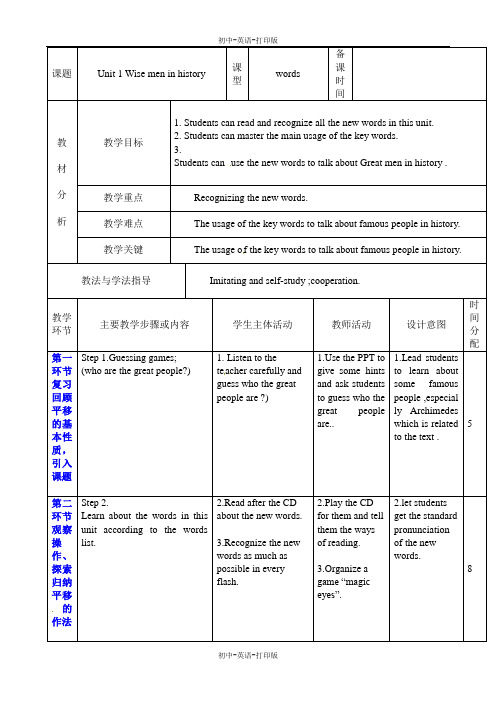
课题Unit 1 Wise men in history 课型words备课时间教材分析教学目标1. Students can read and recognize all the new words in this unit.2. Students can master the main usage of the key words.3.Students can use the new words to talk about Great men in history .教学重点Recognizing the new words.教学难点The usage of the key words to talk about famous people in history.教学关键The usage o f the key words to talk about famous people in history. 教法与学法指导Imitating and self-study ;cooperation.教学环节主要教学步骤或内容学生主体活动教师活动设计意图时间分配第一环节复习回顾平移的基本性质,引入课题Step 1.Guessing games;(who are the great people?)1. Listen to theteacher carefully andguess who the greatpeople are ?)e the PPT togive some hintsand ask studentsto guess who thegreat peopleare..1.Lead studentsto learn aboutsome famouspeople ,especially Archimedeswhich is relatedto the text .5第二环节观察操作、探索归纳平移的作法Step 2.Learn about the words in thisunit according to the wordslist.2.Read after the CDabout the new words.3.Recognize the newwords as much aspossible in everyflash.2.Play the CDfor them and tellthem the waysof reading.anize agame “magiceyes”.2.let studentsget the standardpronunciationof the newwords.8Step 3.Learning the key word s (self-study) 4.Self-study the usageof the key words:golden、Archimedes、agreement、truthseem、solve 、fill、less、hit5.Discuss in Groups tocheck the learningsheet.4.Lead them tolearn the keypoints on thelearn ing sheet(list the usageof the keywords andpresent somerelated exercisese the PPT toemphasize theanswer.3.Cultivatetheir ability ofself-st udy andcooperation aswell as leadthem to masterthe key words.20第三环节课堂练习Step 4 Competition.Using the new words tomake different sentences .6. Work in groups tomake sentences usingthe new words.Try to make as manyas possible.6.Tell thestudents tocompete to usethe new wordswhich group canmake the mostones .4.Lead them torecreate andcompete.5第四环节课时小结Step 5 Summarize the bettergroup and the learning words.7. Discuss to tell thelearning result and thebetter performance.7. Encouragethem to list theirlearning resultand give marksto the bettergroups.5. Make themlearn toevaluatethemselves. 2第五环节课后作业Read the new words until you can keep them in mind.课堂教学流程Guessing the countries →Imitate the new words→Self-study on the key words →using the new words .效果评价与反思。
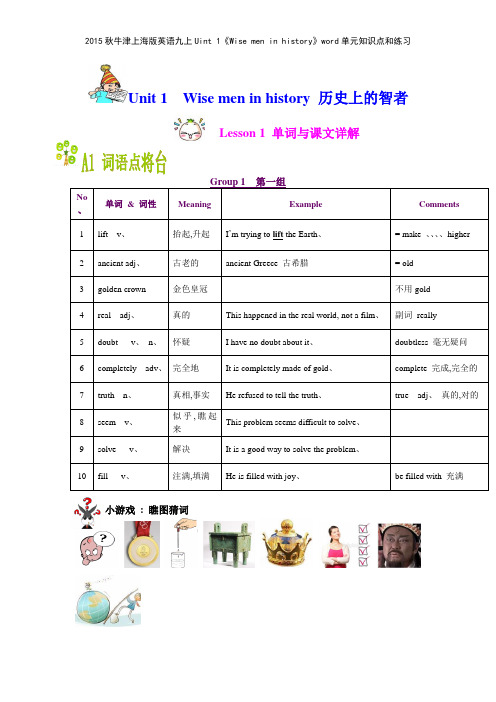
Unit 1 Wise men in history 历史上的智者Lesson 1 单词与课文详解Group 1 第一组No、单词& 词性Meaning Example Comments1 lift v、抬起,升起I’m trying to lift the Earth、= make 、、、、higher2 ancient adj、古老的ancient Greece 古希腊= old3 golden crown 金色皇冠不用gold4 real adj、真的This happened in the real world, not a film、副词really5 doubt v、n、怀疑I have no doubt about it、doubtless 毫无疑问6 completely adv、完全地It is completely made of gold、complete 完成,完全的7 truth n、真相,事实He refused to tell the truth、true adj、真的,对的8 seem v、似乎,瞧起来This problem seems difficult to solve、9 solve v、解决It is a good way to solve the problem、10 fill v、注满,填满He is filled with joy、be filled with 充满小游戏: 瞧图猜词_______ ________ _______ __________ ________ __________ ____________________Group 2 第二组No、单词& 词性Meaning Example Comments11 bath n、浴缸,沐浴We should take a shower instead of taking abath、take a bath洗澡bathroom洗浴室12 bowl n、碗Ben ate three bowls of rice for lunch、bowl碗,pot 罐13 displace v、取代,移走Will apple possibly displace microsoft?dis + place14 less adj、更少的(加不可数名词)Do more, speak less、少说多做。
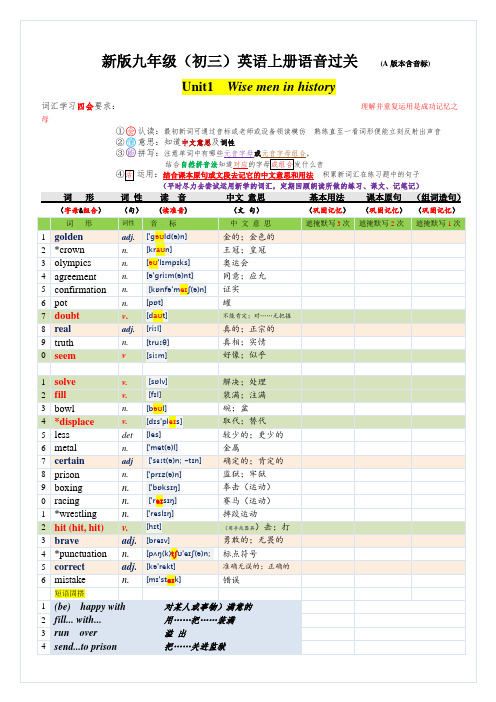
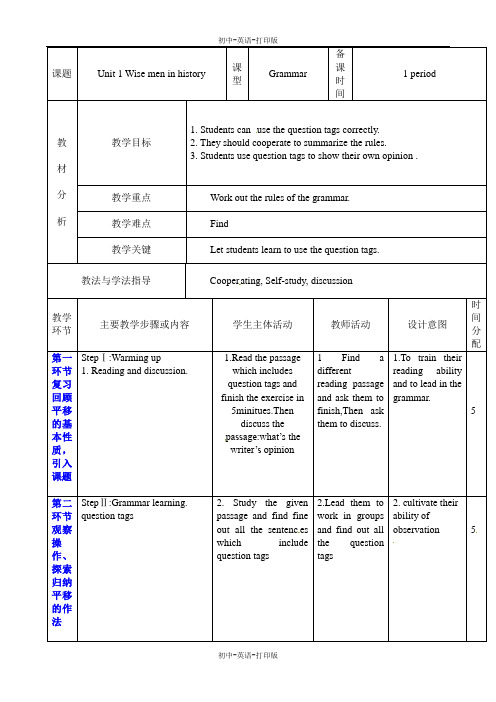
课题Unit 1 Wise men in history 课型Grammar备课时间1 period教材分析教学目标1. Students can use the question tags correctly.2. They should cooperate to summarize the rules.3. Students use question tags to show their own opinion .教学重点Work out the rules of the grammar.教学难点Find教学关键Let students learn to use the question tags.教法与学法指导Cooperating, Self-study, discussion教学环节主要教学步骤或内容学生主体活动教师活动设计意图时间分配第一环节复习回顾平移的基本性质,引入课题StepⅠ:Warming up1. Reading and discussion.1.Read the passagewhich includesquestion tags andfinish the exercise in5minitues.Thendiscuss thepassage:what’s thewriter’s opinion1 Find adifferentreading passageand ask them tofinish,Then askthem to discuss.1.To train theirreading abilityand to lead in thegrammar.5第二环节观察操作、探索归纳平移的作法StepⅡ:Grammar learning.question tags2. Study the givenpassage and find fineout all the sentenc eswhich includequestion tags2.Lead them towork in groupsand find out allthe questiontags2. cultivate theirability ofobservation 53.Observe all thesentences and summarize d ifferent kinds of question tags,Positive statemen t and negative statement Imperatives and exc lamations,then summarize the usage in groups4.To show what they find to the other students5.Finish the exercises in group 3.Ask them tosummarize therules in groupsaccording to theinstructions.4. Encouragethem to use therules to solvethe problems.4. Give ou t thelearning sheetand ask them tofinish theexercises.3. cultivate theirability ofsummarizing4. Enable themto use thegrammar.4.Consolidatethe knowledg ethey learn..第三环节课堂练习StepⅢ: Developing. Use thetext and make a long dialogueretell the story using thequestion tag.(task ---learning)5.Group work to make ast ory as humorous aspossible, usingquestion tag as muchas possible.5. Explain thetask to them:make adialogue,using thegrammar.5.To developtheir creationand imagination第四环节课时小结StepⅣ: show time:Whose group is the mostwonderful?6. Choose a leader topresent your groupwork and listen togive remarks to theother group’s work.Choose the best oneand explain why?6. Encouragethem to showtheir work.6. Train abilityof speaking andusing thegrammar.第五环节课后作业Look up in a reference book tonote down the related grammarrules.7.Cultivate theirhabit of takingnotes.课堂教学流程Reading→Grammar→exercise e→make a dialogue →show time效果评价与反思。
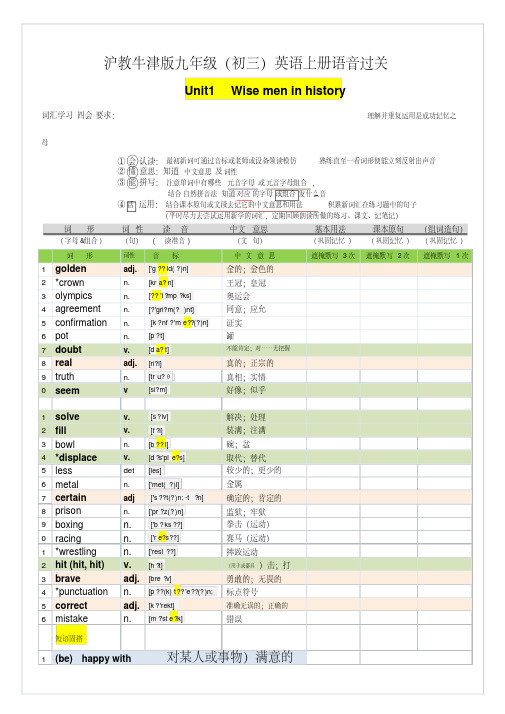
沪教牛津版九年级(初三)英语上册语音过关Unit1Wise men in history词汇学习四会要求:理解并重复运用是成功记忆之母①○会认读:最初新词可通过音标或老师或设备领读模仿熟练直至一看词形便能立刻反射出声音②○懂意思:知道中文意思及词性③○能拼写:注意单词中有哪些元音字母或元音字母组合,结合自然拼音法知道对应的字母或组合发什么音④活运用:结合课本原句或文段去记它的中文意思和用法积累新词汇在练习题中的句子(平时尽力去尝试运用新学的词汇,定期回顾朗读所做的练习、课文、记笔记)词形词性读音中文意思基本用法课本原句(组词造句)(字母&组合)(句) (读准音) (文句)(巩固记忆)(巩固记忆)(巩固记忆)词形词性音标中文意思遮掩默写3次遮掩默写2次遮掩默写1次1 golden adj.['g??ld(?)n]金的;金色的2 *crown n.[kr a?n]王冠;皇冠3 olympics n.[??'l?mp?ks]奥运会4 agreement n.[?'gri?m(?)nt]同意;应允5 confirmation n.[k?nf?'m e??(?)n]证实6 pot n.[p?t]罐7 doubt v. [d a?t]不能肯定;对……无把握8 real adj.[ri?l]真的;正宗的9 truth n.[tr u?θ]真相;实情0 seem v[si?m]好像;似乎1 solve v.[s?lv]解决;处理2 fill v.[f?l]装满;注满3 bowl n.[b??l]碗;盆4 *displace v.[d?s'pl e?s]取代;替代5 less det[les]较少的;更少的6 metal n.['met(?)l]金属7 certain adj['s??t(?)n; -t?n]确定的;肯定的8 prison n.['pr?z(?)n]监狱;牢狱9 boxing n.['b?ks??]拳击(运动)0 racing n.['r e?s??]赛马(运动)1 *wrestling n.['resl??]摔跤运动2 hit (hit, hit) v.[h?t](用手或器具)击;打3 brave adj.[bre?v]勇敢的;无畏的4 *punctuation n.[p??(k)t??'e??(?)n; 标点符号5 correct adj.[k?'rekt]准确无误的;正确的6 mistake n.[m?'st e?k]错误短语固搭对某人或事物)满意的1 (be) happy with2 fill... with...用……把……装满3 run over 溢出4 send...to prison把……关进监狱5 make sure确保;设法保证Unit2 Great minds词汇学习四会要求:理解并重复运用是成功记忆之母①○会认读:最初新词可通过音标或老师或设备领读模仿熟练直至一看词形便能立刻反射出声音②○懂意思:知道中文意思及词性③○能拼写:注意单词中有哪些元音字母或元音字母组合,结合自然拼音法知道对应的字母或组合发什么音④活运用:结合课本原句或文段去记它的中文意思和用法积累新词汇在练习题中的句子(平时尽力去尝试运用新学的词汇,定期回顾朗读所做的练习、课文、记笔记)词形词性读音中文意思基本用法课本原句(组词造句)(读准音) (句)(字母&组合)(文句)(巩固记忆)(巩固记忆)(巩固记忆)词形词性音标中文意思遮掩默写3次遮掩默写2次遮掩默写1次1 mind n.[m a?nd]聪明人富有才智的人2 astronomer n.[?'str?n?m?]天文学家3 *genius n.['d?i?n??s]天才4 consider v.[k?n's?d?]认为;觉得5 sense n.[sens]理解力;判断力6 humour n.['hju?m?]幽默7 invitation n[?nv?'t e??(?)n]邀请8 theory n['θ??r?]学说;论;说9 university n[ju?n?'v??s?t?]综合性大学0 pleasure n['ple??]乐事;快事1 avoid v.[?'v??d]避免;避开2 lecture n['lek t??]讲座;演讲3 tonight adv.[t?'n a?t]在今夜;在今晚4 audience n.['??d??ns]观众;听众5 trust v[tr?st]信任;信赖6 seat n.[si?t]座位7 *applause n.[?'pl??z]鼓掌;喝彩8 pale adj.[p e?l]苍白的9 achievement n.[?'t?i?vm(?)nt]成就;成绩0 universe n.['ju?n?v??s]宇宙1 *philosopher n.[f?'l?s?f?]哲学家2 obey v.[?(?)'b e?]服从;遵守3 reduce v.[r?'dj u?s]减少;缩小4 exactly adv[?g'z?k(t)l?]精确地;准确地5 action n.['?k?(?)n](故事、戏剧中的)情节sense of humour 幽默感let ... down 使失望by heart 单凭记忆;能背诵take a seat 坐下have no idea 丝毫不知道(be) in trouble 倒霉;处于困境play a joke on sb. 跟某人开玩笑;turning point转折点without difficulty 轻而易举a series of 一系列join in 参加;加入困难像弹簧,你强它就弱!你弱,它就强!!Unit3Family life in cities词汇学习四会要求:理解并重复运用是成功记忆之母①○会认读:最初新词可通过音标或老师或设备领读模仿熟练直至一看词形便能立刻反射出声音②○懂意思:知道中文意思及词性③○能拼写:注意单词中有哪些元音字母或元音字母组合,结合自然拼音法知道对应的字母或组合发什么音④活运用:结合课本原句或文段去记它的中文意思和用法积累新词汇在练习题中的句子(平时尽力去尝试运用新学的词汇,定期回顾朗读所做的练习、课文、记笔记)词形词性读音中文意思基本用法课本原句(组词造句)(读准音) (句)(字母&组合)(文句)(巩固记忆)(巩固记忆)(巩固记忆)词形词性音标中文意思遮掩默写3次遮掩默写2次遮掩默写1次1 meal n[mi?l]一顿饭2 share v[?e?]把自己的想法(或经历、感情)告诉(某人)3 decision n[d?'s??(?)n]决定;抉择4 *possessions n.[p?'ze??nz][pl.] 个人财产;私人物品5 expect v. [?k'sp?kt]要求;指望6 abroad adv.[?'br?d]在国外;到国外7 business n.[?b?zn?s]商务;公事8 personal adj.['p?s?nl]个人的;私人的9 set v.[s?t] [set]安排;确定;决定0 daughter n.['d?t?]女儿1 mind v.[ma?nd]介意2 fashionable adj.['f??n?bl]流行的;时髦的3 fashion n.['f???n]流行款式;时兴样式4 out-of-date adj.['aut?v'deit]过时的5 iron v.['a??n(用熨斗)熨;烫平6 event n.[?'vent]公开活动7 suppose v.[s?'p??z](根据所知)认为8 either adv.['a?e?; 'i?-](用于否定词组后)也9 relationship n.[r?'le??(?)n??p]关系;联系0 invite v.[?n'va?t]邀请1 cost (cost) v.[k?st]需付费;价钱为2 type n.[ta?p]类型;种类(be) on business 出差have no interest in对……没有兴趣help with 帮着做*学习、复习痕迹(备忘)复习第2次:___月___号星期__ time:______________ 大致时长:_____分钟备忘录: 1.2.3.复习第3次:___月___号星期__ time:______________ 大致时长:_____分钟复习第4次:___月___号星期__ time:______________复习第5次:___月___号星期__ time:______________Unit4 Problems and advice词汇学习四会要求:理解并重复运用是成功记忆之母①○会认读:最初新词可通过音标或老师或设备领读模仿熟练直至一看词形便能立刻反射出声音②○懂意思:知道中文意思及词性③○能拼写:注意单词中有哪些元音字母或元音字母组合,结合自然拼音法知道对应的字母或组合发什么音④活运用:结合课本原句或文段去记它的中文意思和用法积累新词汇在练习题中的句子(平时尽力去尝试运用新学的词汇,定期回顾朗读所做的练习、课文、记笔记)词形词性读音中文意思基本用法课本原句(组词造句)(读准音) (句)(字母&组合)(文句)(巩固记忆)(巩固记忆)(巩固记忆)词形词性音标中文意思遮掩默3次遮掩默2次遮掩默1次1 online adj.[?n'la?n]在线的2 model n.['m?dl]模特儿3 diet n.['da??t]规定饮食4 though conj.[e??]虽然;尽管5 awful adj.['??f?l]很坏的;极讨厌的6 regret v.[r?'gret]懊悔7 ashamed adj.[?'?e?md]惭愧;羞愧8 situation n.[s?tj?'e??(?)n]情况;状况9 braces n.pl.['breisiz](儿童)牙箍0 hate v.[he?t]厌恶;憎恶1 advantage n[?d'vɑ?nt?d?]优势2 embarrassed adj.[?m'b?r?st; ]窘迫的;尴尬的3 suggest v.[s?'d?est]建议;倡议4 mad.adj[m?d]很生气;气愤5 mess n[mes]杂乱;不整洁6 annoying adj[?'n????]使恼怒的;使生气的7 fail v[fe?l]不及格8 careless adj.['ke?l?s]粗心造成的9 comment n['k?ment]评论0 request n[r?'kwest]要求;请求1 polite adj[p?'la?t]有礼貌的2 none pron[n?n]没有一个;毫无3 exam n.[?g'z?m; ]考试(be) on a diet 节食laugh at 嘲笑;讥笑feel ashamed of 对……感到羞愧让某人受不了make a mess 搞得一塌糊涂out of place 格格不入drive sb. mad与某人无关hear from收到某人的信件(或电子邮件、电话等)none of one’s business近期学习心得感受:反思:我近期是怎么学习的?我的词汇学习有长进吗?下一步我该怎样去做?我的目标一定要实现!我的付出一定要有收获,我也相信我的付出一定会有收获!Unit5 Action词汇学习四会要求:理解并重复运用是成功记忆之母①○会认读:最初新词可通过音标或老师或设备领读模仿熟练直至一看词形便能立刻反射出声音②○懂意思:知道中文意思及词性③○能拼写:注意单词中有哪些元音字母或元音字母组合,结合自然拼音法知道对应的字母或组合发什么音④活运用:结合课本原句或文段去记它的中文意思和用法积累新词汇在练习题中的句子(平时尽力去尝试运用新学的词汇,定期回顾朗读所做的练习、课文、记笔记)词形词性读音中文意思基本用法课本原句(组词造句)(读准音) (句)(字母&组合)(文句)(巩固记忆)(巩固记忆)(巩固记忆)词形词性音标中文意思遮掩默写3次遮掩默写2次遮掩默写1次1 praise n.[pre?z]赞扬;称赞2 view v.[vju?]看;观看3 script n.[skr?pt]广播(或讲话等)稿4 director n.[d?'rekt?; 导演5 make-up n.[mek?p]化妆6 artist n.['ɑ?t?st]艺术家7 studio n.['stju?d???]演播室8 contestant n.[k?n'test(?)nt]比赛者9 upon prep.[?'p?n]在……上0 among prep.[?'m??]在……中1 onto prep.['?ntu?]向;朝2 forward adv.['f??w?d]向前3 second n.['sek(?)nd]秒(时间单位)放松的;冷静的4 relaxed.adj[ri'l?ks]5 ahead of prep.领先6 beat beaten v.[bi?t]赢;打败(某人)7 still adj.[st?l]平静的;安静的8 single adj.['s??g(?)l]仅有一个的;单个的9 victory n['v?kt(?)r?]胜利;成功0 England n.['i?ɡl?nd]英格兰1 lucky adj.['l?k?]幸运的;运气好的2 news n[nju?z]新闻报道3 survey n.[s?'ve?]民意调查floor plan楼层平面图talent show 达人秀pass out 昏迷;失去知觉keep still 保持冷静;保持不动(的状态)emergency exit 紧急出口on weekdays 在工作日(周一至周五)*学习、复习痕迹(备忘)复习第2次:___月___号星期__ time:______________ 大致时长:_____分钟备忘录: 1.2.复习第3次:___月___号星期__ time:______________ 大致时长:_____分钟复习第4次:___月___号星期__ time:______________复习第5次:___月___号星期__ time:______________Unit6 Healthy diet词汇学习四会要求:理解并重复运用是成功记忆之母①○会认读:最初新词可通过音标或老师或设备领读模仿熟练直至一看词形便能立刻反射出声音②○懂意思:知道中文意思及词性③○能拼写:注意单词中有哪些元音字母或元音字母组合,结合自然拼音法知道对应的字母或组合发什么音④活运用:结合课本原句或文段去记它的中文意思和用法积累新词汇在练习题中的句子(平时尽力去尝试运用新学的词汇,定期回顾朗读所做的练习、课文、记笔记)词形词性读音中文意思基本用法课本原句(组词造句)(读准音) (句)(字母&组合)(文句)(巩固记忆)(巩固记忆)(巩固记忆)词形词性音标中文意思遮掩默写3次遮掩默写2次遮掩默写1次1 *preference n.['pref(?)r(?)ns]偏爱;喜爱2 review n.[r?'vju?]评价;评论3 bean n.[bi?n]豆;豆荚4 beef n.[bi?f]牛肉5 product n['pr?d?kt]产品;制品6 *protein n['pr??ti?n]蛋白质7 hamburger n.['h?mb??g?]汉堡包8 *cola n.['k??l?]一罐、一瓶可乐9 sandwich n.['s?n(d)w?d?; 三明治0 salad n.['s?l?d]色拉1 medical adj.['med?k(?)l]医疗的2 fat n.[f?t]脂肪3 sugar n['??g?]食糖4 state n.[ste?t]说明5 necessary adj.['nes?s(?)r?]必需的;必要的.6 research n.[r?'s??t?; 'ri?s??t?]研究;调查7 plenty pron['plent?]大量;充足8 usual adj['ju????l]通常的;寻常的9 coffee n.['k?f?]咖啡0 treat v[tri?t]买(可享受的东西)1 customer n['k?st?m?]顾客2 title n['ta?t(?)l]标题;题目3 serve v[s??v]提供4 pound n[pa?nd]英镑5 pie n[pa?]果馅饼;果馅派6 *chip n.[t??p]炸薯条7 service n.['s??v?s]服务8 seat v.[si?t](使)就座a balanced diet 均衡饮食dairy product 乳制品stay away from 离开;不接近fried food 油炸食品soft drink 软饮料(不含酒精)medical examination 体格检查lose weight 减肥plenty of 大量;充足in general 通常;大体上treat oneself to sth. 给自己买某物(be) prepared to do sth. 愿意做某事Unit7 The Adventures of Tom Sawyer词汇学习四会要求:理解并重复运用是成功记忆之母①○会认读:最初新词可通过音标或老师或设备领读模仿熟练直至一看词形便能立刻反射出声音②○懂意思:知道中文意思及词性③○能拼写:注意单词中有哪些元音字母或元音字母组合,结合自然拼音法知道对应的字母或组合发什么音④活运用:结合课本原句或文段去记它的中文意思和用法积累新词汇在练习题中的句子(平时尽力去尝试运用新学的词汇,定期回顾朗读所做的练习、课文、记笔记)词形词性读音中文意思基本用法课本原句(组词造句)(读准音) (句)(字母&组合)(文句)(巩固记忆)(巩固记忆)(巩固记忆)词形词性音标中文意思遮掩默写3次遮掩默写2次遮掩默写1次1 adventure n.[?d'vent??]冒险;冒险经历2 novel n.['n?v(?)l](长篇)小说3 frog n.[fr?g]蛙;青蛙4 congratulations pl.[k?n,gr?t??'le??nz]祝贺;恭贺5 *sympathy n.['s?mp?θ?]同情6 steamboat n['sti?mb??t]汽船;轮船7 steam n.[sti?m]蒸汽动力;蒸汽8 writer n.['ra?t?]作家9 humorous adj.['hju?m(?)r?s]滑稽有趣的;0 fence n[fens]栅栏;篱笆1 task n[tɑ?sk]任务;工作2 yard n[jɑ?d]码(长度单位)3 board n.[b??d]木板4 survey v.[s?'ve?]查看;审视5 progress v.['pr??gres]进展6 rest n.[rest]休息时间7 pity n.['p?t?]遗憾;可惜8 silence n.['sa?l?ns]沉默;缄默9 while n[wa?l]一段时间;一会儿0 careful adj.['ke?f?l; 小心;谨慎1 deal n[di?l]交易2 coat n.[k??t]涂料层;覆盖层3 celebrated adj.['sel?bre?t?d]著名的;闻名的4 lead n.[li?d]铅5 *plot n.[pl?t]故事情节6 lazy adj.['le?z?]懒惰的7 pretend v.[pr?'tend]假装;佯装have a rest 休息一下think of 想像到come along 出现what a pity 真可惜go on doing 不停地做in silence 沉默地after a while 过了一会儿turn sth. over 使翻转trick sb. into doing sth. 诱使某人做某事*学习、复习痕迹(备忘)Unit8 Surprise endings词汇学习四会要求:理解并重复运用是成功记忆之母①○会认读:最初新词可通过音标或老师或设备领读模仿熟练直至一看词形便能立刻反射出声音②○懂意思:知道中文意思及词性③○能拼写:注意单词中有哪些元音字母或元音字母组合,结合自然拼音法知道对应的字母或组合发什么音④活运用:结合课本原句或文段去记它的中文意思和用法积累新词汇在练习题中的句子(平时尽力去尝试运用新学的词汇,定期回顾朗读所做的练习、课文、记笔记)词形词性读音中文意思基本用法课本原句(组词造句)(读准音) (句)(字母&组合)(文句)(巩固记忆)(巩固记忆)(巩固记忆)词形词性音标中文意思遮掩默3次遮掩默2次遮掩默1次1 gift n.[g?ft]礼物2 graduation n.[gr?d??'e??(?)n;毕业典礼3 cent n.[sent]分;分币4 count v.[ka?nt]计算(或清点)总数5 afford v.[?'f??d]买得起6 present n.['prez(?)nt]礼物7 knee n.[ni?]膝;膝盖8 sign n.[sa?n]招牌;标牌9 goods pl.[ɡ?dz]*商品;货品1 search v.[s??t?]搜寻;查找2 chain n[t?e?n]链子3 bill n.[b?l]账单4 step n.[step]脚步声5 draw v.[dr??]掏出6 set n[set]一套;一组7 comb n[k??m]发插;数字8 accuse v.[?'kju?z]控告;控诉9 America n.[?'mer?k?]美洲0 wife n.[wa?f]妻子1 album n.['?lb?m]相册;影集2 note n[n??t]笔记;记录look for 寻找;寻求at last 终于;最终fix ... on 集中(目光、注意力等)于hold out 递出(be) accused of ... 被控告……;被指责……;under the name (of) ... 用……名字;以……假名近期学习心得感受:反思:我近期是怎么学习的?我的词汇学习有长进吗?下一步我该怎样去做?我的目标一定要实现!我的付出一定要有收获!。
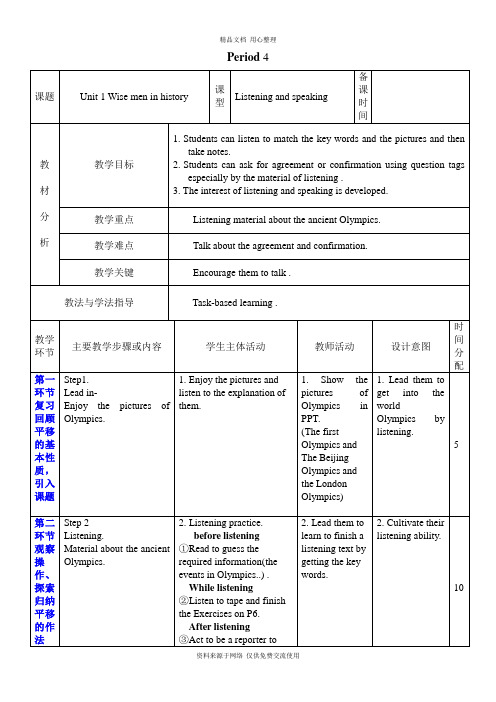
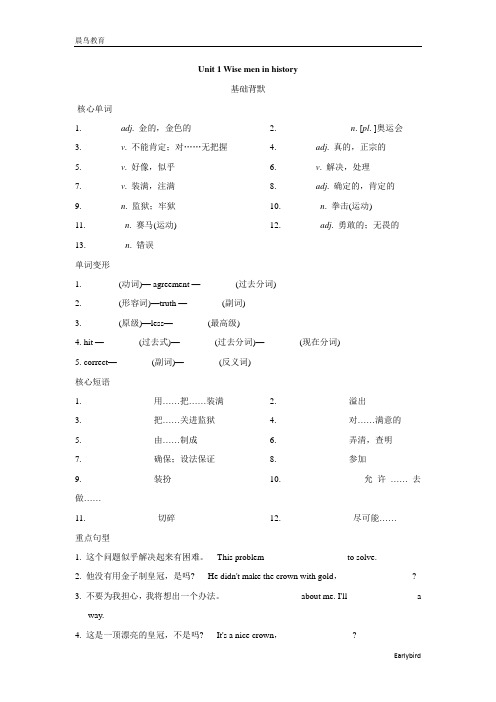
Unit 1 Wise men in history基础背默核心单词1. ________ adj. 金的,金色的2. ________________ n. [pl. ]奥运会3. ________ v. 不能肯定;对……无把握4. ________ adj. 真的,正宗的5. ________ v. 好像,似乎6. ________ v. 解决,处理7. ________ v. 装满,注满8. ________ adj. 确定的,肯定的9. ________ n. 监狱;牢狱10. ________ n. 拳击(运动)11. ________ n. 赛马(运动) 12. ________ adj. 勇敢的;无畏的13. ________ n. 错误单词变形1. ________(动词)— agreement —________(过去分词)2. ________(形容词)—truth —________(副词)3. ________(原级)—less—________(最高级)4. hit —________(过去式)—________(过去分词)—________(现在分词)5. correct—________(副词)—________(反义词)核心短语1. ________________用……把……装满2. ________________溢出3. ________________把……关进监狱4. ________________对……满意的5. ________________由……制成6. ________________弄清,查明7. ________________确保;设法保证8. ________________参加9. ________________装扮10. ________________允许……去做……11. ________________切碎12. ________________尽可能……重点句型1. 这个问题似乎解决起来有困难。
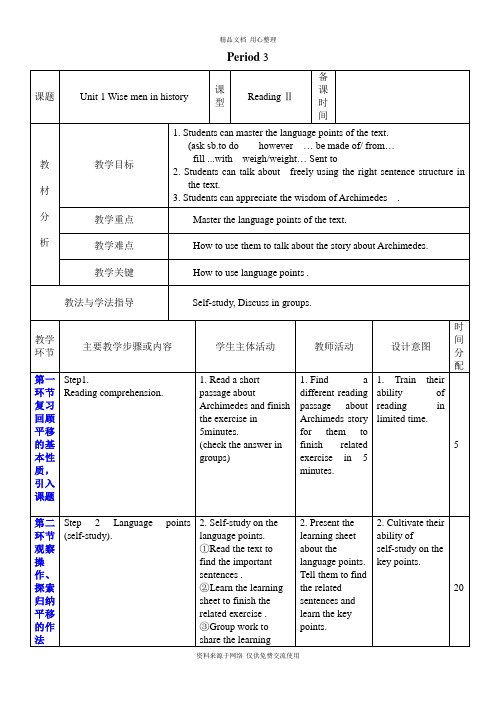
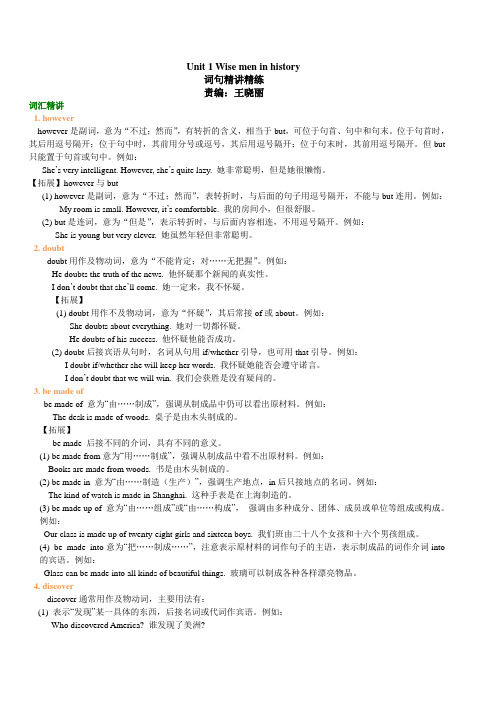
Unit 1 Wise men in history词句精讲精练责编:王晓丽词汇精讲1. howeverhowever是副词,意为“不过;然而”,有转折的含义,相当于but,可位于句首、句中和句末。
位于句首时,其后用逗号隔开;位于句中时,其前用分号或逗号,其后用逗号隔开;位于句末时,其前用逗号隔开。
但but 只能置于句首或句中。
例如:She’s very intelligent. However, she’s quite lazy. 她非常聪明,但是她很懒惰。
【拓展】however与but(1) however是副词,意为“不过;然而”,表转折时,与后面的句子用逗号隔开,不能与but连用。
例如:My room is small. However, it’s comfortable. 我的房间小,但很舒服。
(2) but是连词,意为“但是”,表示转折时,与后面内容相连,不用逗号隔开。
例如:She is young but very clever. 她虽然年轻但非常聪明。
2. doubtdoubt用作及物动词,意为“不能肯定;对……无把握”。
例如:He doubts the truth of the news. 他怀疑那个新闻的真实性。
I don’t doubt that she’ll come. 她一定来,我不怀疑。
【拓展】(1) doubt用作不及物动词,意为“怀疑”,其后常接of或about。
例如:She doubts about everything. 她对一切都怀疑。
He doubts of his success. 他怀疑他能否成功。
(2) doubt后接宾语从句时,名词从句用if/whether引导,也可用that引导。
例如:I doubt if/whether she will keep her words. 我怀疑她能否会遵守诺言。
I don’t doubt that we will win. 我们会获胜是没有疑问的。
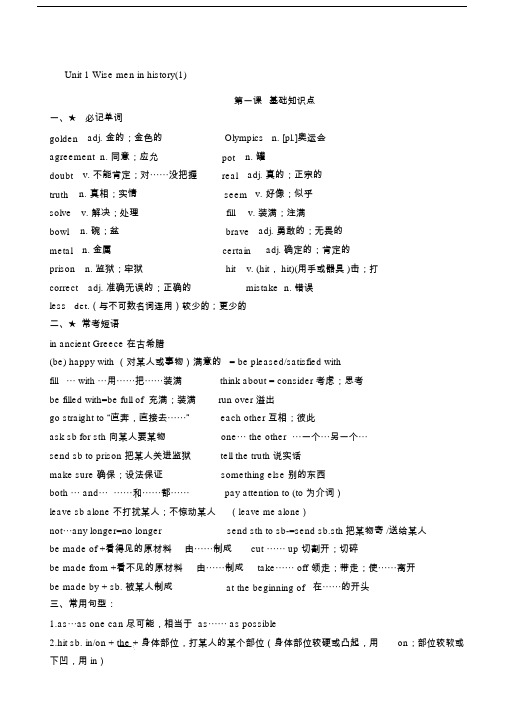
Unit 1 Wise men in history(1)第一课基础知识点一、★必记单词golden adj. 金的;金色的Olympics n. [pl.]奥运会agreement n. 同意;应允pot n. 罐doubt v. 不能肯定;对⋯⋯没把握real adj. 真的;正宗的truth n. 真相;实情seem v. 好像;似乎solve v. 解决;处理fill v. 装满;注满bowl n. 碗;盆brave adj. 勇敢的;无畏的metal n. 金属certain adj. 确定的;肯定的prison n. 监狱;牢狱hit v. (hit, hit)(用手或器具 )击;打correct adj. 准确无误的;正确的mistake n. 错误less det.(与不可数名词连用)较少的;更少的二、★ 常考短语in ancient Greece 在古希腊(be) happy with (对某人或事物)满意的 = be pleased/satisfied withfill ⋯ with ⋯用⋯⋯把⋯⋯装满think about = consider 考虑;思考be filled with=be full of 充满;装满run over 溢出go straight to “直奔,直接去⋯⋯”each other 互相;彼此ask sb for sth 向某人要某物one⋯ the other ⋯一个⋯另一个⋯send sb to prison 把某人关进监狱tell the truth 说实话make sure 确保;设法保证something else 别的东西both ⋯ and⋯⋯⋯和⋯⋯都⋯⋯pay attention to (to 为介词)leave sb alone 不打扰某人;不惊动某人(leave me alone)not⋯any longer=no longer send sth to sb-=send sb.sth把某物寄 /送给某人be made of +看得见的原材料由⋯⋯制成cut ⋯⋯ up 切割开;切碎be made from +看不见的原材料由⋯⋯制成take⋯⋯ off 领走;带走;使⋯⋯离开be made by + sb. 被某人制成at the beginning of 在⋯⋯的开头三、常用句型:1.as⋯as one can 尽可能,相当于 as⋯⋯ as possible2.hit sb. in/on + the + 身体部位,打某人的某个部位(身体部位较硬或凸起,用on;部位较软或下凹,用 in)。
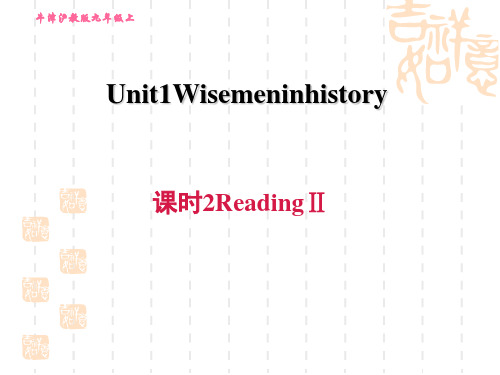
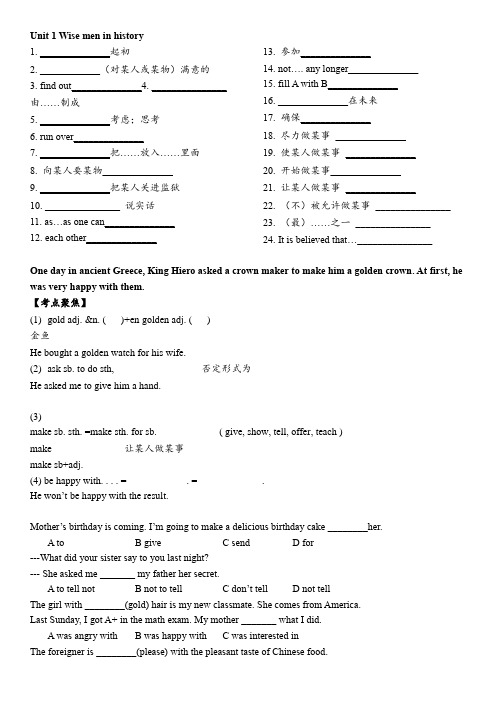
Unit 1 Wise men in history1. ______________起初2. ____________(对某人或某物)满意的3. find out______________4. _______________由……制成5. ______________考虑;思考6. run over______________7. ______________把……放入……里面8. 向某人要某物______________9. ______________把某人关进监狱10. _______________ 说实话11. as…as one can______________12. each other______________ 13. 参加______________14. not…. any longer______________15. fill A with B______________16. ______________在未来17. 确保______________18. 尽力做某事______________19. 使某人做某事______________20. 开始做某事______________21. 让某人做某事______________22. (不)被允许做某事_______________23. (最)……之一_______________24. It is believed that…_______________One day in ancient Greece, King Hiero asked a crown maker to make him a golden crown. At first, he was very happy with them.【考点聚焦】(1)gold adj. &n. ( )+en golden adj. ( )金鱼__________He bought a golden watch for his wife.(2)ask sb. to do sth, ________________ 否定形式为_________________He asked me to give him a hand.(3)make sb. sth. =make sth. for sb. ____________( give, show, tell, offer, teach )make ______________让某人做某事make sb+adj. ____________(4) be happy with. . . . =____________. =_____________.He won’t be happy with the result.Mother’s birthday is coming. I’m going to make a delicious birthday cake ________her.A toB giveC sendD for---What did your sister say to you last night?--- She asked me _______ my father her secret.A to tell notB not to tellC don’t tellD not tellThe girl with ________(gold) hair is my new classmate. She comes from America.Last Sunday, I got A+ in the math exam. My mother _______ what I did.A was angry withB was happy withC was interested inThe foreigner is ________(please) with the pleasant taste of Chinese food.Later,however,he began to doubt that it was a real golden crown. 【考点聚焦】(1)辨析:however与but两者都有“然而,但是”的意思。
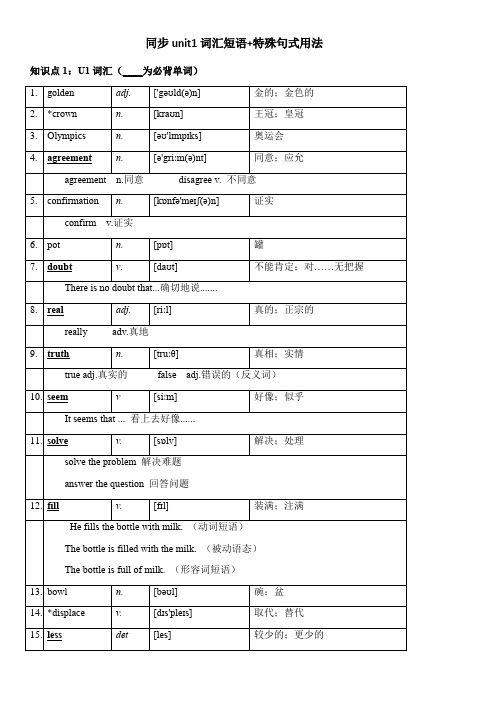
同步unit1词汇短语+特殊句式用法知识点1:U1词汇(____为必背单词)知识点2:短语自查过关打√体系搭建一、高频词汇1. by的用法(1) by + doing 通过……方式I study by working with friends. 我通过和朋友一起学习。
① I study English by (listen) to tapes.(2) 构成“by+交通工具”结构by rocket 乘火箭b y train 乘火车by plane=by air乘飞机by subway 乘地铁【知识拓展】1.“with+名词”表示用某种工具或身体的某个部位。
2.“through+名词”指方法或手段时,意为“经由,通过,以”。
3.“in+名词”表示用某种材料或语言。
4.on后常跟交通工具或电信工具的名词。
He often writes __________his left hand.I have learned many English songs __________TV.We can see many stars in the sky __________telescopes.Please answer this question __________English.2.discoverdiscover通常用作及物动词,主要用法有:(1)表示“发现”某一具体的东西,后接名词或代词作宾语。
例如:Who discovered America? 谁发现了美洲?(2)表示“发现”某一情况,可接名词或代词作宾语,也可接特殊疑问词+不定式作宾语。
例We soon discovered the truth. 我们很快发现了事实真相。
We haven’t discovered how to improve it. 我们还没找到如何改进它的办法。
【拓展】辨析:discover,find及invent(1)discover意为“发现,发觉(原先没看见或不知道的事物)”。
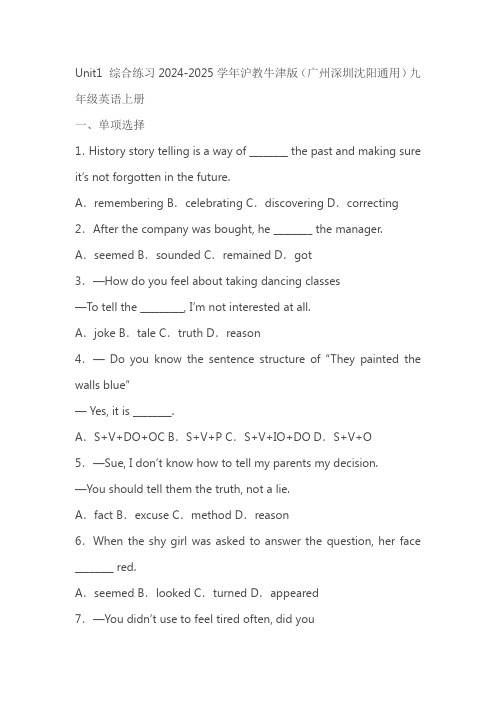
Unit1 综合练习2024-2025学年沪教牛津版(广州深圳沈阳通用)九年级英语上册一、单项选择1.History story telling is a way of ________ the past and making sure it’s not forgotten in the future.A.remembering B.celebrating C.discovering D.correcting 2.After the company was bought, he ________ the manager. A.seemed B.sounded C.remained D.got3.—How do you feel about taking dancing classes—To tell the _________, I’m not interested at all.A.joke B.tale C.truth D.reason4.—Do you know the sentence structure of “They painted the walls blue”— Yes, it is ________.A.S+V+DO+OC B.S+V+P C.S+V+IO+DO D.S+V+O 5.—Sue, I don’t know how to tell my parents my decision.—You should tell them the truth, not a lie.A.fact B.excuse C.method D.reason6.When the shy girl was asked to answer the question, her face ________ red.A.seemed B.looked C.turned D.appeared7.—You didn’t use to feel tired often, did you—________. Just this year.A.Yes, I did B.Yes, I didn’t C.No, I did D.No, I didn’t 8.—Do you know March 21 is World Sleep Day Sleep is important to us.—Yes. A good sleep gives us ________ and makes us happy. A.truth B.fame C.peach D.energy9.—There is a beautiful park near your school, _______—Yes. I often go walking there.A.is there B.isn’t thereC.are there D.aren’t there10.—What’s wrong with Tina, she i s crying so hard.—It is hard for her to ________ with her toys. But it’s time for school now.A.fill B.part C.live D.cover11.People should eat ________ fat to reduce the risk of heart disease. A.less B.further C.fewer D.more12.—You have made such a great progress on your English. —Thanks. I believe ________ you work, ________ you will be.A.the less; the better B.the harder; the betterC.the more; the better D.the better; the worse13.My mum is busy cleaning the house. She needs some help, ________A.need she B.needn’t she C.does she D.doesn’t she 14.Riding a shared-bike to go to work is good for the ________. A.environment B.agreement C.excitement D.development 15.The math problem can’t be solved overnight. Please try _________ time.A.bigger B.longer C.less D.better16.—Our city soccer team needs someone to ________ the role of manager now.—Good news! Can I have a tryA.have B.put C.drop D.fill17.Lucy is so great! She was ________ to challenge herself yesterday. A.scared enough B.enough scared C.brave enough D.enough brave18.—Your uncle used to study in a European country, didn’t he — ________. And he found a job and stayed there for a few years. A.Yes, he did B.Yes, he has C.No, he didn’t D.No, he hasn’t 19.—He’s already back to Zhenjiang, _______—_______. He’s on a visit to Shanghai.A.isn’t he; No B.hasn’t he; YesC.is he; No D.has he; Yes20.Nothing can ever ________ real love and family togetherness. A.take place B.in place of C.instead D.displace二、语法选择My mother moved to Guangzhou one month ago. Since my mother moved to live with us in Guangzhou, she 21 much heavier than before. As time went by, her health got even 22 . So I had to take her to see a doctor. My mother 23 to lose weight by doing exercise every day. She had no choice but to follow 24 the doctor said. In order not to make her feel lonely, I decided to exercise with her every morning.On 25 first morning, she got up very early and ran with me in our neighborhood. At first, I ran 26 slowly that she could follow me. After we ran together for 27 minutes, I told her the proper ways of exercise and the importance of eating healthy food. She looked at me and listened to me 28 . It made me remember that she told me everything very patiently when I was a kid. On the following morning, I praised her for keeping 29 with me.30 after two weeks, she wanted to give up running because she thought the two-week exercise didn’t work at all. To encourage her,I taught her how to use the facilities(设施) for exercise in the gym31 is not far away. She felt 32 and began to exercise again.33 my help, she made great progress. It took her one month 34 a good habit of daily exercise. “Thank you, my dear daughter. Exercise brings health and happiness to me. I will never worryabout 35 health.”Her words touched my heart deeply. I felt joyful to make a big difference to my mother’s life.21.A.was B.is C.will be D.has been22.A.bad B.worse C.worst D.the worst23.A.told B.tell C.was told D.was telling24.A.what B.that C.which D.how25.A.a B.an C./ D.the26.A.very B.such C.quite D.so27.A.few B.a few C.little D.a little28.A.carefully B.careful C.more careful D.more carefully 29.A.to run B.run C.running D.ran30.A.But B.Or C.And D.So31.A.who B.which C.when D.whose 32.A.happiness B.happily C.happy D.happier 33.A.With B.On C.To D.In34.A.develop B.developing C.to develop D.developed 35.A.me B.my C.I D.mine三、完形填空Games and sports teach people a lot of useful skills, as well as helping them to keep fit and healthy.Lots of people love team sports. They enjoy being a member of ateam so they have the chance to take part in the 36 and events. They also enjoy sharing the 37 or failure of the matches with others. While playing, people have to 38 each other, or they can never win. At the same time, it is important to respect rules, because no game will work fine 39 everyone follows the rules. Team games also teach you that 40 is not the end of the world. Don’t be sad. You will always have another chance to work together with other members and win.However, many people just don’t like team sports because they can’t do team sports alone and have to find other 41 to exercise. Some may have a bad experience with a kind of team sport when they were 42 . Maybe they feel embarrassed because they think they’re not very good at a sport. T hey 43 letting others down. So individual (个人的) activities are more 44 for them. They can do them in their own way.Whether team sports or individual activities, always play sports 45 and lead positive lives!36.A.bands B.concerts C.matches D.festivals 37.A.sports B.success C.tickets D.result38.A.forget B.become C.support D.find 39.A.unless B.when C.if D.though40.A.winning B.playing C.watching D.losing41.A.ways B.places C.rules D.players42.A.older B.younger C.taller D.shorter43.A.worry about B.set up C.look for D.give up 44.A.thirsty B.thankful C.suitable D.responsible 45.A.heavily B.happily C.sadly D.easily四、阅读理解AMany people today like exercising. Some like to run, and some like to walk. Others like to dance or play ball games. They do different kin ds of exercise. Why do people like exercising Because it’s good for their health. And exercise helps make them tired, so they sleep better at night.You may like to run. If you do, take care of your feet. Make sure you have the right shoes. Some people like to run on the roads, but they must watch out for cars.Walking is good exercise. You may take a long walk in the park. It’s more fun to go with a friend. The two of you may have a good time. Some people like to swim. But others don’t like to go into the water. If you like this kind of exercise, make sure that someone is watching you. You must always take care when you are in the water. Jumping rope and riding a bike are also good exercise.There are many other kinds of exercise. Find out what you like. Youmay need help at first. Some people often do exercise, and they can help you. Do exercise every day, and you will know how it makes you feel.46.The passage tells us about ________.A.running B.swimming C.walking D.exercise47.If you want to run for exercise, you should ________. A.have the right shoes B.run fast on the roadsC.go with a friend D.let everyone watch you48.The underlined phrase “watch out for” means “________” in Chinese,A.向外看B.向车外看C.小心D.担心49.How many kinds of exercise are mentioned in the passage A.15. B.6. C.7. D.8.50.What should you do if you want to do exerciseA.Find out what you like. B.Ask for help first.C.Exercise every day. D.A, B and C.BMarco Polo was one of the world’s most famous explorers (探险家). He was born in Venice, Italy in 1254. When he was 17 years old, he went on a trip to Asia that lasted 24 years. Marco Polo’s travel later influenced many people.In 1271, Marco Polo left Venice with his father and uncle and setout for Asia. The purpose of their trip was to meet with Kublai Khan who ruled a large part of Asia. On their way to meet the king at his palace in China, they traveled trough much of the Middle East and Central Asia. In 1275, they finally arrived at the palace of Kublai Khan. Kublai Khan liked Marco Polo so much that he wanted Marco Polo to work for him. So, the king sent Marco Polo to different places in China, India and Burma. Marco Polo stayed in China with Kublai Khan for 17 years. Over that time, he collected many jewels and lots of gold. Marco saw paper made by the Chinese. People in China had also discovered how to paint on paper. They had many books and even used paper money!Marco Polo returned to Venice with his father and uncle in 1295. People often went to Marco Polo’s home to hear stories about his travels. He became a great storyteller. Marco Polo was famous as “the man with a million stories”. He later met a writer who was crazy about his stories. The writer liked them so much that he wrote a book about Marco Polo’s travels.The book about Mar co Polo’s travels taught Europeans about places in Asia they knew little about. The book also taught people about the geography of Asia. Some of these people were explorers who used the information in Marco Polo’s book on their own journeys. The best known of these explorers was ChristopherColumbus.51.How long did it take Marco Polo to go to China from Venice A.4 years. B.7 years. C.14 years. D.17 years.52.What did Marco Polo do during the years in ChinaA.He collected many books about China. B.He made friends with Chinese explorers.C.He worked for Kublai Khan. D.He wrote a lot about China. 53.In what order did the following happen to Marco Poloa. He collected jewels and gold in China.b. He told stories of his travels to Europeans.c. He went on a trip to Asia with his father and uncle.d. He traveled through a large part of Central Asia and the Middle East.e. He headed for China, India and Burma.A.d→e→c→b→a B.c→d→e→a→b C.d→e→b→c→a D.c→e→a→d→b54.Which of the following best describes Marco Polo A.Funny and hardworking. B.Helpful and skillful. C.Pleasant and humorous. D.Brave and responsible.五、选词填空选用方框内所给词的适当形式完成短文(每词限用一次)。
